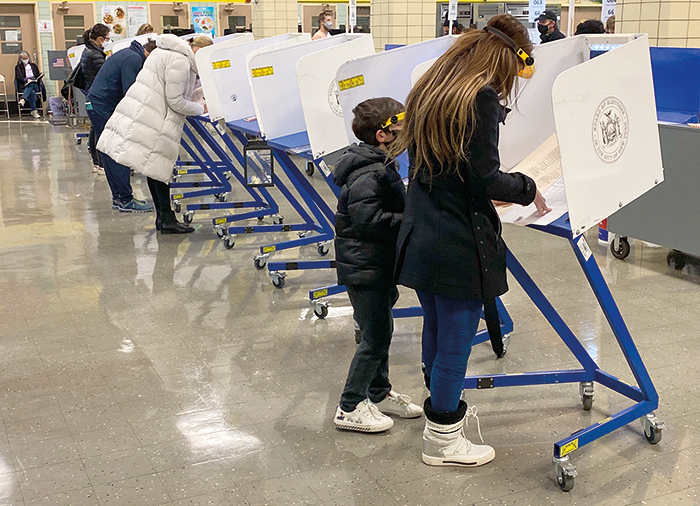Photo Courtesy of Michael Appleton/Mayoral Photography Office
The Voter Empowerment Act was originally authored in the House by civil rights icon Rep. John Lewis, who passed away last year.
By Forum Staff
On Thursday, U.S. Senators Kirsten Gillibrand and Reverend Raphael Warnock, and U.S. House Majority Whip James E. Clyburn and Rep. Nikema Williams announced the reintroduction of the bicameral Voter Empowerment Act, legislation originally authored in the House by civil rights icon Rep. John Lewis, who passed away last year. This legislation would help protect the voting rights of people across the country by ensuring equal access to the ballot for every eligible voter, modernizing voter registration, and helping to eliminate deceptive practices that deter people from voting. The Voter Empowerment Act is a cornerstone of the For the People Act: a voting rights, anti-corruption and clean elections reform package.
According to the elected officials, the Voter Empowerment Act takes a comprehensive approach to close the gaps in voting access and ensure that every American can participate in the electoral process. Specifically, it would do the following:
- Requires states to make available online voter registration, correction, cancellation and designation of party affiliation.
Requires states to automatically register to vote any eligible unregistered citizens.
Establishes same-day voter registration, including during early voting.
Prohibits purging of voter rolls by limiting the authority of states to remove registrants from the official list of eligible voters in elections for federal office in the state based on interstate voter registration crosschecks.
Makes it unlawful to hinder, interfere or prevent an individual from registering to vote, and requires the Election Assistance Commission to develop best practices for states to deter and prevent such violations.
Requires states to promote access to voter registration and voting for persons with disabilities and older individuals. Funds grants to improve voting accessibility for persons with disabilities and creates a pilot program to allow persons with disabilities to register and vote from home.
Prohibits the use of returned non-forwardable mail as the basis for removing registered voters from the rolls. Prohibits challenges to eligibility from individuals who are not election officials without an oath of good faith factual basis.
Requires at least 15 consecutive days of early voting for federal elections. Requires that early voting locations be near public transportation, in rural areas and open for at least 10 hours per day.
Prohibits a state from imposing restrictions on vote by mail, requires the state to implement a program to track and confirm receipt of mail ballots, and requires the prepayment of postage and return envelopes.
Makes it unlawful to provide false information about elections in order to hinder or discourage voting.
Increases penalties for voter intimidation and prescribes sentencing guidelines for those individuals found guilty of such deceptive practices.
Restores federal voting rights to individuals with a criminal record, so long as they are not serving a felony sentence in a correctional facility. Requires states and the federal government to notify individuals convicted of state or federal felonies, respectively, of their re-enfranchisement.
Eliminates the existing funding cap
Requires each state to comply with any Election Assistance Commission request for post-election survey following any regularly scheduled general election for federal office
Directs the Election Assistance Commission to assess the security, cybersecurity and effectiveness of the commission’s information technology systems.

